University Reflection: BUSM3150 Applied Management Learning Journey
VerifiedAdded on 2022/11/26
|8
|1648
|236
Report
AI Summary
This assignment is a comprehensive academic reflection on a student's learning journey through a BUSM3150 Applied Management course. The reflection details the student's understanding of the course content, including weekly segmentation and key topics such as scientific management, project management, leadership theories, and financial control. It explores the theoretical underpinnings, emphasizing the practical applications of management theories and their relevance to the student's future career. The assignment also examines the student's individual role and participation in the learning program, highlighting personal growth and the development of leadership skills. Furthermore, it analyzes team dynamics in group projects, the learning derived from collaborative efforts, and the application of concepts such as trial and error and scientific management. The student reflects on how the course has enhanced their understanding of teamwork, decision-making, and the importance of reflection in their performance.
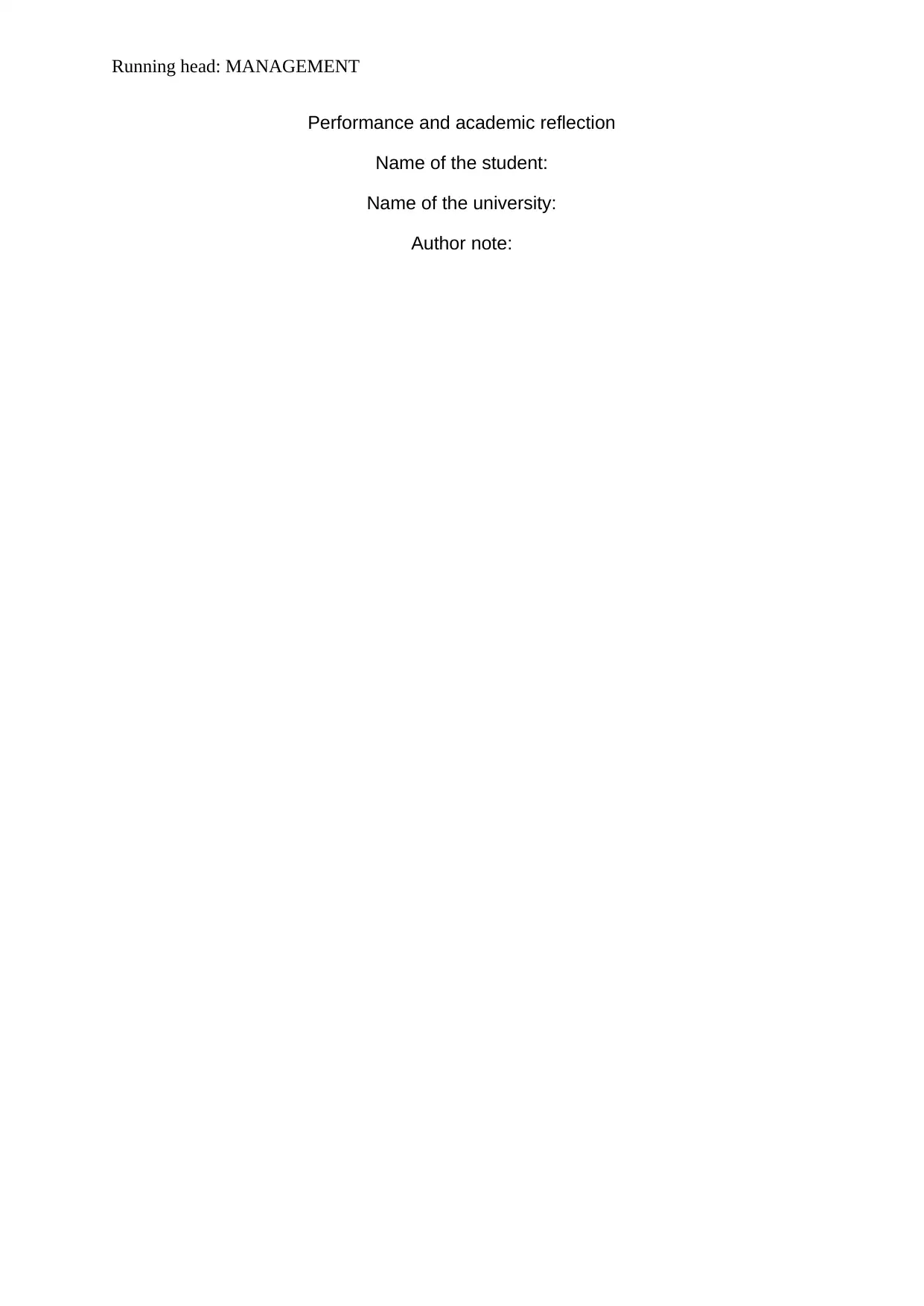
Running head: MANAGEMENT
Performance and academic reflection
Name of the student:
Name of the university:
Author note:
Performance and academic reflection
Name of the student:
Name of the university:
Author note:
Paraphrase This Document
Need a fresh take? Get an instant paraphrase of this document with our AI Paraphraser
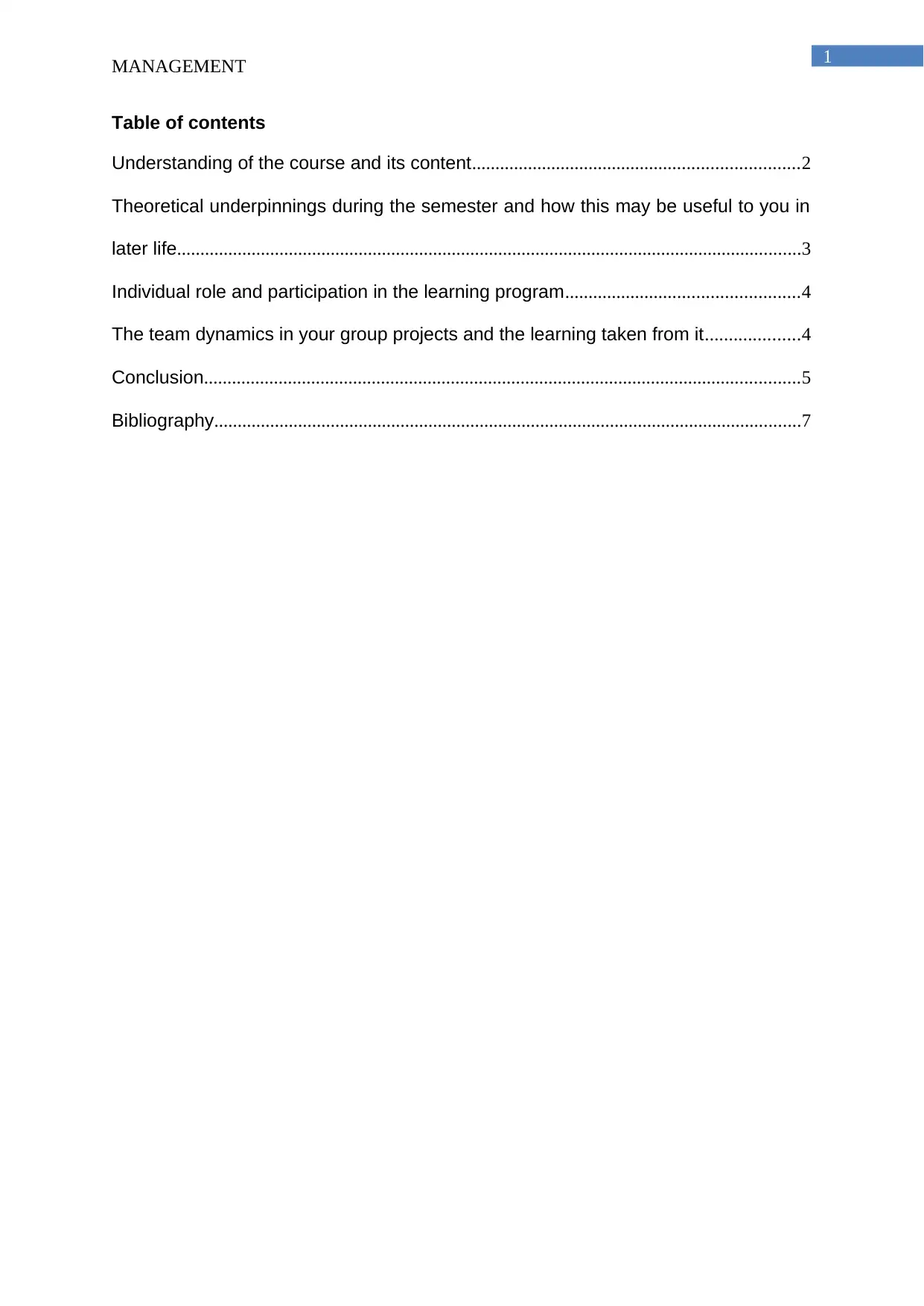
1
MANAGEMENT
Table of contents
Understanding of the course and its content......................................................................2
Theoretical underpinnings during the semester and how this may be useful to you in
later life......................................................................................................................................3
Individual role and participation in the learning program..................................................4
The team dynamics in your group projects and the learning taken from it....................4
Conclusion................................................................................................................................5
Bibliography..............................................................................................................................7
MANAGEMENT
Table of contents
Understanding of the course and its content......................................................................2
Theoretical underpinnings during the semester and how this may be useful to you in
later life......................................................................................................................................3
Individual role and participation in the learning program..................................................4
The team dynamics in your group projects and the learning taken from it....................4
Conclusion................................................................................................................................5
Bibliography..............................................................................................................................7
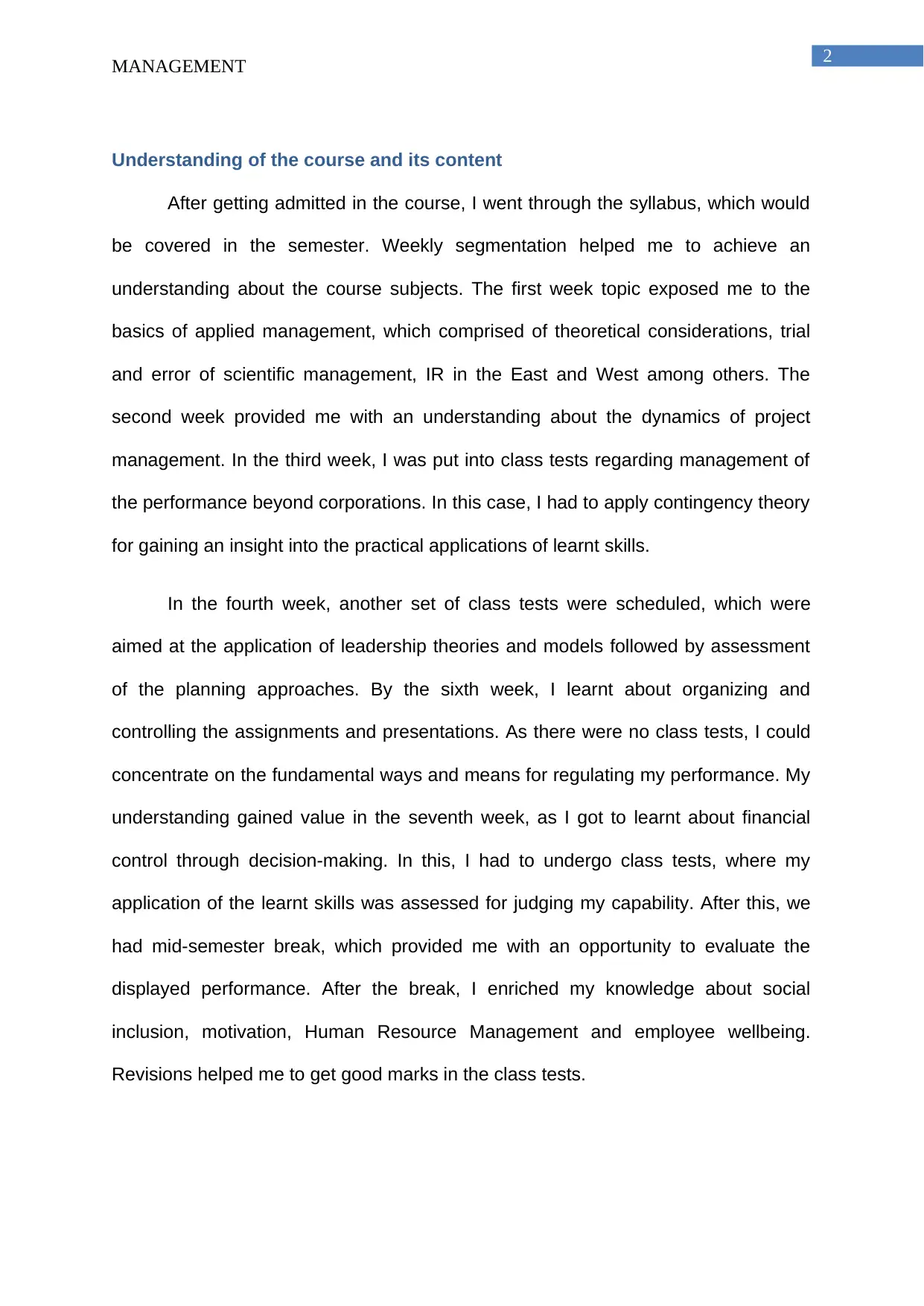
2
MANAGEMENT
Understanding of the course and its content
After getting admitted in the course, I went through the syllabus, which would
be covered in the semester. Weekly segmentation helped me to achieve an
understanding about the course subjects. The first week topic exposed me to the
basics of applied management, which comprised of theoretical considerations, trial
and error of scientific management, IR in the East and West among others. The
second week provided me with an understanding about the dynamics of project
management. In the third week, I was put into class tests regarding management of
the performance beyond corporations. In this case, I had to apply contingency theory
for gaining an insight into the practical applications of learnt skills.
In the fourth week, another set of class tests were scheduled, which were
aimed at the application of leadership theories and models followed by assessment
of the planning approaches. By the sixth week, I learnt about organizing and
controlling the assignments and presentations. As there were no class tests, I could
concentrate on the fundamental ways and means for regulating my performance. My
understanding gained value in the seventh week, as I got to learnt about financial
control through decision-making. In this, I had to undergo class tests, where my
application of the learnt skills was assessed for judging my capability. After this, we
had mid-semester break, which provided me with an opportunity to evaluate the
displayed performance. After the break, I enriched my knowledge about social
inclusion, motivation, Human Resource Management and employee wellbeing.
Revisions helped me to get good marks in the class tests.
MANAGEMENT
Understanding of the course and its content
After getting admitted in the course, I went through the syllabus, which would
be covered in the semester. Weekly segmentation helped me to achieve an
understanding about the course subjects. The first week topic exposed me to the
basics of applied management, which comprised of theoretical considerations, trial
and error of scientific management, IR in the East and West among others. The
second week provided me with an understanding about the dynamics of project
management. In the third week, I was put into class tests regarding management of
the performance beyond corporations. In this case, I had to apply contingency theory
for gaining an insight into the practical applications of learnt skills.
In the fourth week, another set of class tests were scheduled, which were
aimed at the application of leadership theories and models followed by assessment
of the planning approaches. By the sixth week, I learnt about organizing and
controlling the assignments and presentations. As there were no class tests, I could
concentrate on the fundamental ways and means for regulating my performance. My
understanding gained value in the seventh week, as I got to learnt about financial
control through decision-making. In this, I had to undergo class tests, where my
application of the learnt skills was assessed for judging my capability. After this, we
had mid-semester break, which provided me with an opportunity to evaluate the
displayed performance. After the break, I enriched my knowledge about social
inclusion, motivation, Human Resource Management and employee wellbeing.
Revisions helped me to get good marks in the class tests.
⊘ This is a preview!⊘
Do you want full access?
Subscribe today to unlock all pages.

Trusted by 1+ million students worldwide
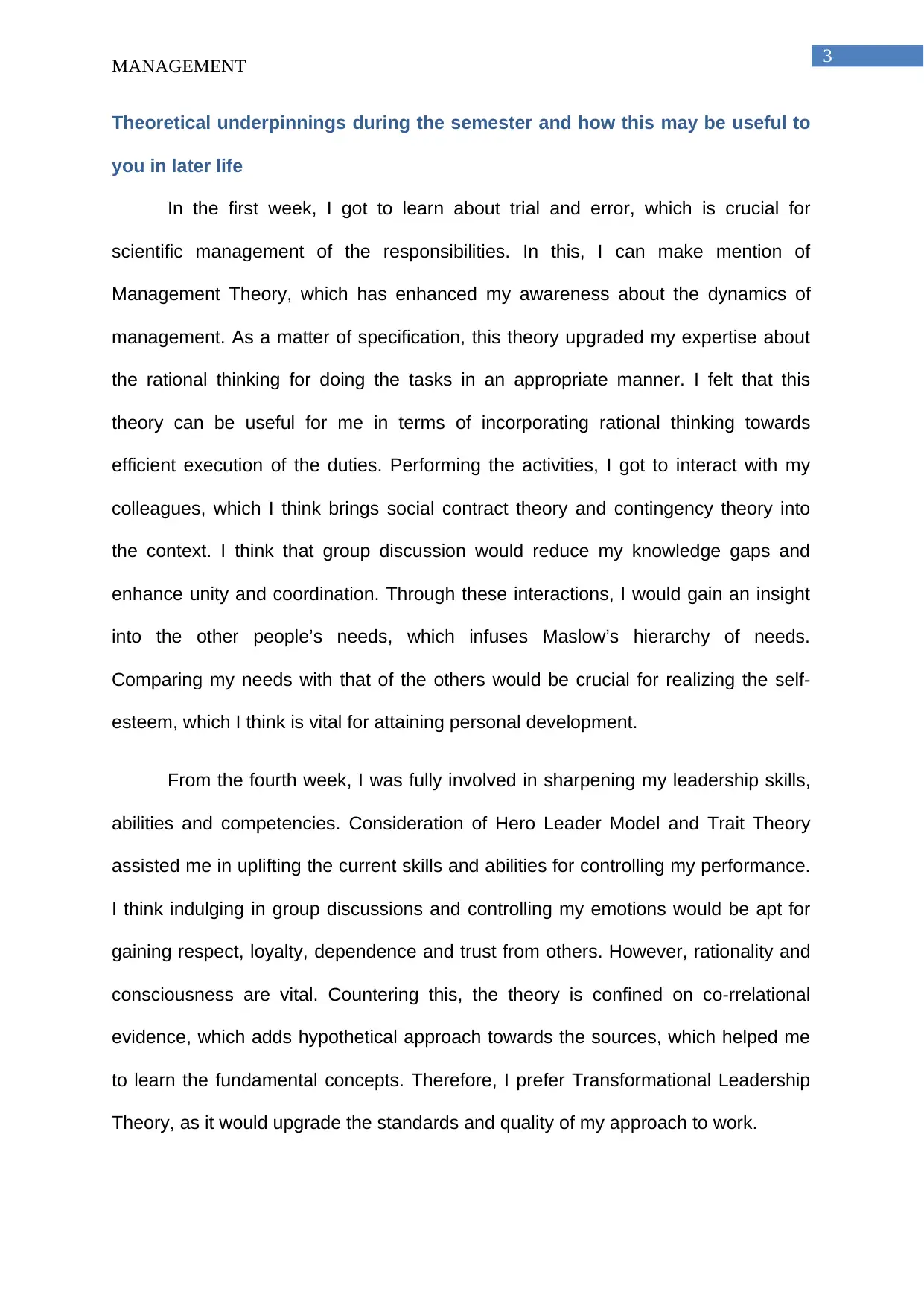
3
MANAGEMENT
Theoretical underpinnings during the semester and how this may be useful to
you in later life
In the first week, I got to learn about trial and error, which is crucial for
scientific management of the responsibilities. In this, I can make mention of
Management Theory, which has enhanced my awareness about the dynamics of
management. As a matter of specification, this theory upgraded my expertise about
the rational thinking for doing the tasks in an appropriate manner. I felt that this
theory can be useful for me in terms of incorporating rational thinking towards
efficient execution of the duties. Performing the activities, I got to interact with my
colleagues, which I think brings social contract theory and contingency theory into
the context. I think that group discussion would reduce my knowledge gaps and
enhance unity and coordination. Through these interactions, I would gain an insight
into the other people’s needs, which infuses Maslow’s hierarchy of needs.
Comparing my needs with that of the others would be crucial for realizing the self-
esteem, which I think is vital for attaining personal development.
From the fourth week, I was fully involved in sharpening my leadership skills,
abilities and competencies. Consideration of Hero Leader Model and Trait Theory
assisted me in uplifting the current skills and abilities for controlling my performance.
I think indulging in group discussions and controlling my emotions would be apt for
gaining respect, loyalty, dependence and trust from others. However, rationality and
consciousness are vital. Countering this, the theory is confined on co-rrelational
evidence, which adds hypothetical approach towards the sources, which helped me
to learn the fundamental concepts. Therefore, I prefer Transformational Leadership
Theory, as it would upgrade the standards and quality of my approach to work.
MANAGEMENT
Theoretical underpinnings during the semester and how this may be useful to
you in later life
In the first week, I got to learn about trial and error, which is crucial for
scientific management of the responsibilities. In this, I can make mention of
Management Theory, which has enhanced my awareness about the dynamics of
management. As a matter of specification, this theory upgraded my expertise about
the rational thinking for doing the tasks in an appropriate manner. I felt that this
theory can be useful for me in terms of incorporating rational thinking towards
efficient execution of the duties. Performing the activities, I got to interact with my
colleagues, which I think brings social contract theory and contingency theory into
the context. I think that group discussion would reduce my knowledge gaps and
enhance unity and coordination. Through these interactions, I would gain an insight
into the other people’s needs, which infuses Maslow’s hierarchy of needs.
Comparing my needs with that of the others would be crucial for realizing the self-
esteem, which I think is vital for attaining personal development.
From the fourth week, I was fully involved in sharpening my leadership skills,
abilities and competencies. Consideration of Hero Leader Model and Trait Theory
assisted me in uplifting the current skills and abilities for controlling my performance.
I think indulging in group discussions and controlling my emotions would be apt for
gaining respect, loyalty, dependence and trust from others. However, rationality and
consciousness are vital. Countering this, the theory is confined on co-rrelational
evidence, which adds hypothetical approach towards the sources, which helped me
to learn the fundamental concepts. Therefore, I prefer Transformational Leadership
Theory, as it would upgrade the standards and quality of my approach to work.
Paraphrase This Document
Need a fresh take? Get an instant paraphrase of this document with our AI Paraphraser
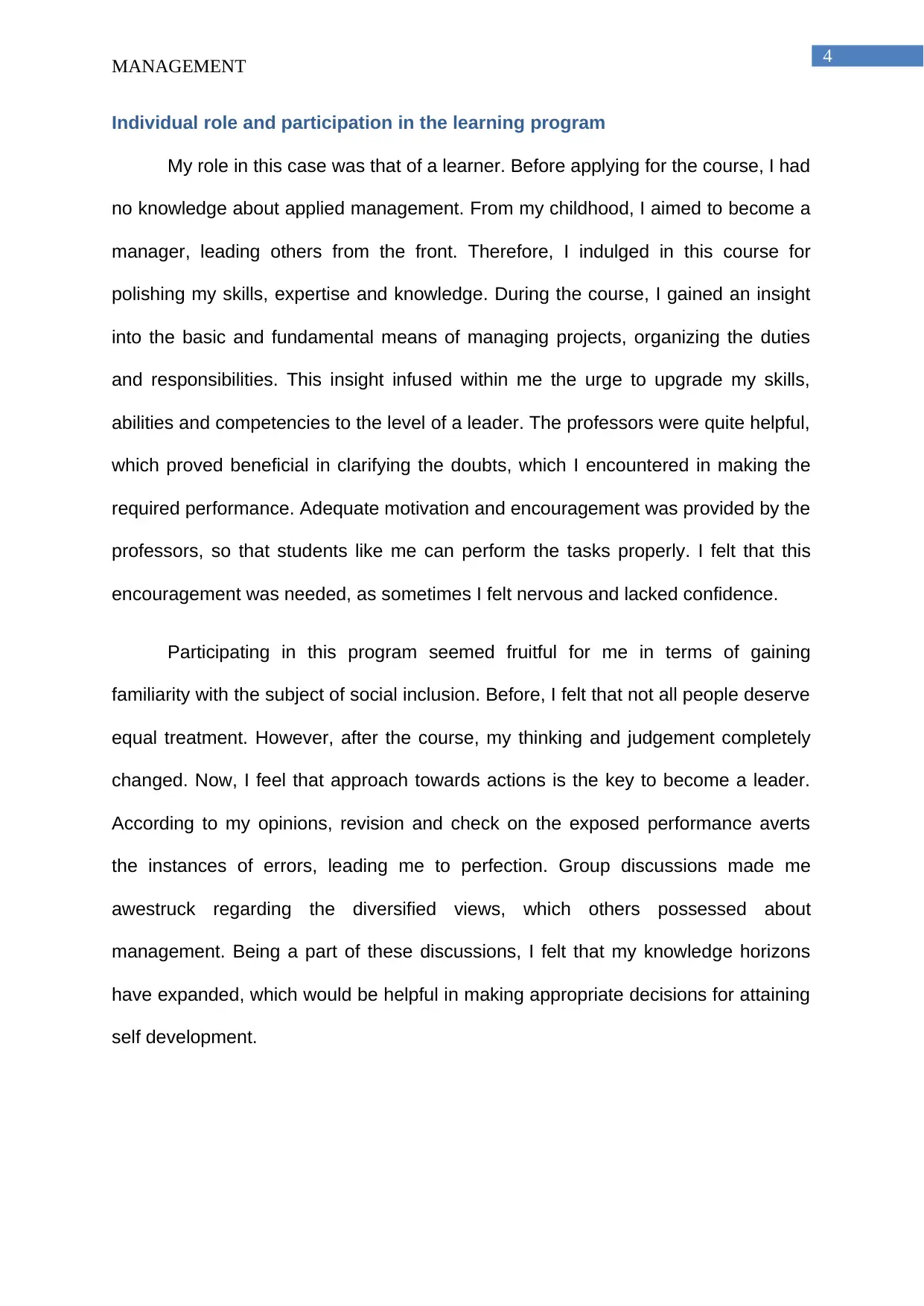
4
MANAGEMENT
Individual role and participation in the learning program
My role in this case was that of a learner. Before applying for the course, I had
no knowledge about applied management. From my childhood, I aimed to become a
manager, leading others from the front. Therefore, I indulged in this course for
polishing my skills, expertise and knowledge. During the course, I gained an insight
into the basic and fundamental means of managing projects, organizing the duties
and responsibilities. This insight infused within me the urge to upgrade my skills,
abilities and competencies to the level of a leader. The professors were quite helpful,
which proved beneficial in clarifying the doubts, which I encountered in making the
required performance. Adequate motivation and encouragement was provided by the
professors, so that students like me can perform the tasks properly. I felt that this
encouragement was needed, as sometimes I felt nervous and lacked confidence.
Participating in this program seemed fruitful for me in terms of gaining
familiarity with the subject of social inclusion. Before, I felt that not all people deserve
equal treatment. However, after the course, my thinking and judgement completely
changed. Now, I feel that approach towards actions is the key to become a leader.
According to my opinions, revision and check on the exposed performance averts
the instances of errors, leading me to perfection. Group discussions made me
awestruck regarding the diversified views, which others possessed about
management. Being a part of these discussions, I felt that my knowledge horizons
have expanded, which would be helpful in making appropriate decisions for attaining
self development.
MANAGEMENT
Individual role and participation in the learning program
My role in this case was that of a learner. Before applying for the course, I had
no knowledge about applied management. From my childhood, I aimed to become a
manager, leading others from the front. Therefore, I indulged in this course for
polishing my skills, expertise and knowledge. During the course, I gained an insight
into the basic and fundamental means of managing projects, organizing the duties
and responsibilities. This insight infused within me the urge to upgrade my skills,
abilities and competencies to the level of a leader. The professors were quite helpful,
which proved beneficial in clarifying the doubts, which I encountered in making the
required performance. Adequate motivation and encouragement was provided by the
professors, so that students like me can perform the tasks properly. I felt that this
encouragement was needed, as sometimes I felt nervous and lacked confidence.
Participating in this program seemed fruitful for me in terms of gaining
familiarity with the subject of social inclusion. Before, I felt that not all people deserve
equal treatment. However, after the course, my thinking and judgement completely
changed. Now, I feel that approach towards actions is the key to become a leader.
According to my opinions, revision and check on the exposed performance averts
the instances of errors, leading me to perfection. Group discussions made me
awestruck regarding the diversified views, which others possessed about
management. Being a part of these discussions, I felt that my knowledge horizons
have expanded, which would be helpful in making appropriate decisions for attaining
self development.
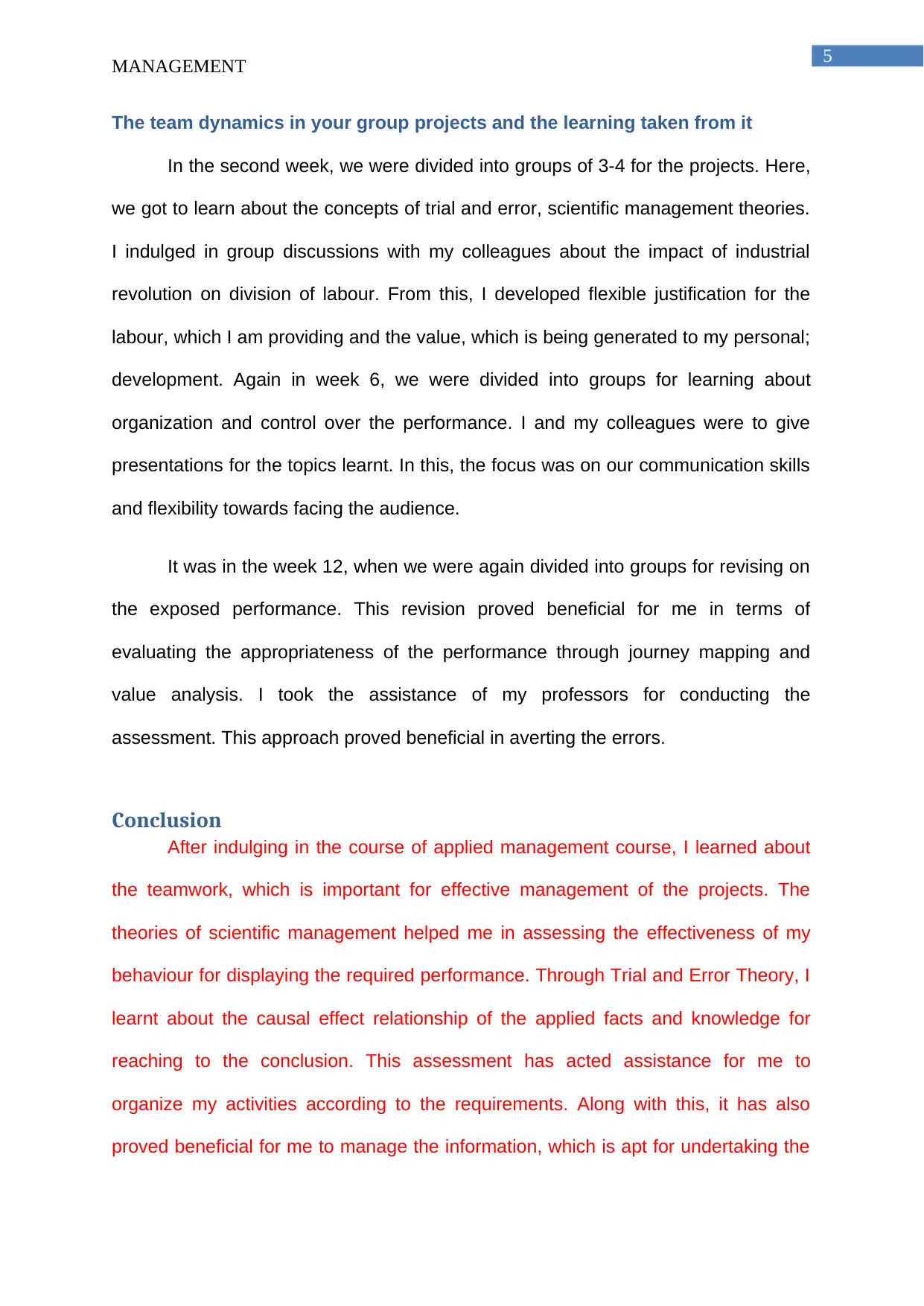
5
MANAGEMENT
The team dynamics in your group projects and the learning taken from it
In the second week, we were divided into groups of 3-4 for the projects. Here,
we got to learn about the concepts of trial and error, scientific management theories.
I indulged in group discussions with my colleagues about the impact of industrial
revolution on division of labour. From this, I developed flexible justification for the
labour, which I am providing and the value, which is being generated to my personal;
development. Again in week 6, we were divided into groups for learning about
organization and control over the performance. I and my colleagues were to give
presentations for the topics learnt. In this, the focus was on our communication skills
and flexibility towards facing the audience.
It was in the week 12, when we were again divided into groups for revising on
the exposed performance. This revision proved beneficial for me in terms of
evaluating the appropriateness of the performance through journey mapping and
value analysis. I took the assistance of my professors for conducting the
assessment. This approach proved beneficial in averting the errors.
Conclusion
After indulging in the course of applied management course, I learned about
the teamwork, which is important for effective management of the projects. The
theories of scientific management helped me in assessing the effectiveness of my
behaviour for displaying the required performance. Through Trial and Error Theory, I
learnt about the causal effect relationship of the applied facts and knowledge for
reaching to the conclusion. This assessment has acted assistance for me to
organize my activities according to the requirements. Along with this, it has also
proved beneficial for me to manage the information, which is apt for undertaking the
MANAGEMENT
The team dynamics in your group projects and the learning taken from it
In the second week, we were divided into groups of 3-4 for the projects. Here,
we got to learn about the concepts of trial and error, scientific management theories.
I indulged in group discussions with my colleagues about the impact of industrial
revolution on division of labour. From this, I developed flexible justification for the
labour, which I am providing and the value, which is being generated to my personal;
development. Again in week 6, we were divided into groups for learning about
organization and control over the performance. I and my colleagues were to give
presentations for the topics learnt. In this, the focus was on our communication skills
and flexibility towards facing the audience.
It was in the week 12, when we were again divided into groups for revising on
the exposed performance. This revision proved beneficial for me in terms of
evaluating the appropriateness of the performance through journey mapping and
value analysis. I took the assistance of my professors for conducting the
assessment. This approach proved beneficial in averting the errors.
Conclusion
After indulging in the course of applied management course, I learned about
the teamwork, which is important for effective management of the projects. The
theories of scientific management helped me in assessing the effectiveness of my
behaviour for displaying the required performance. Through Trial and Error Theory, I
learnt about the causal effect relationship of the applied facts and knowledge for
reaching to the conclusion. This assessment has acted assistance for me to
organize my activities according to the requirements. Along with this, it has also
proved beneficial for me to manage the information, which is apt for undertaking the
⊘ This is a preview!⊘
Do you want full access?
Subscribe today to unlock all pages.

Trusted by 1+ million students worldwide
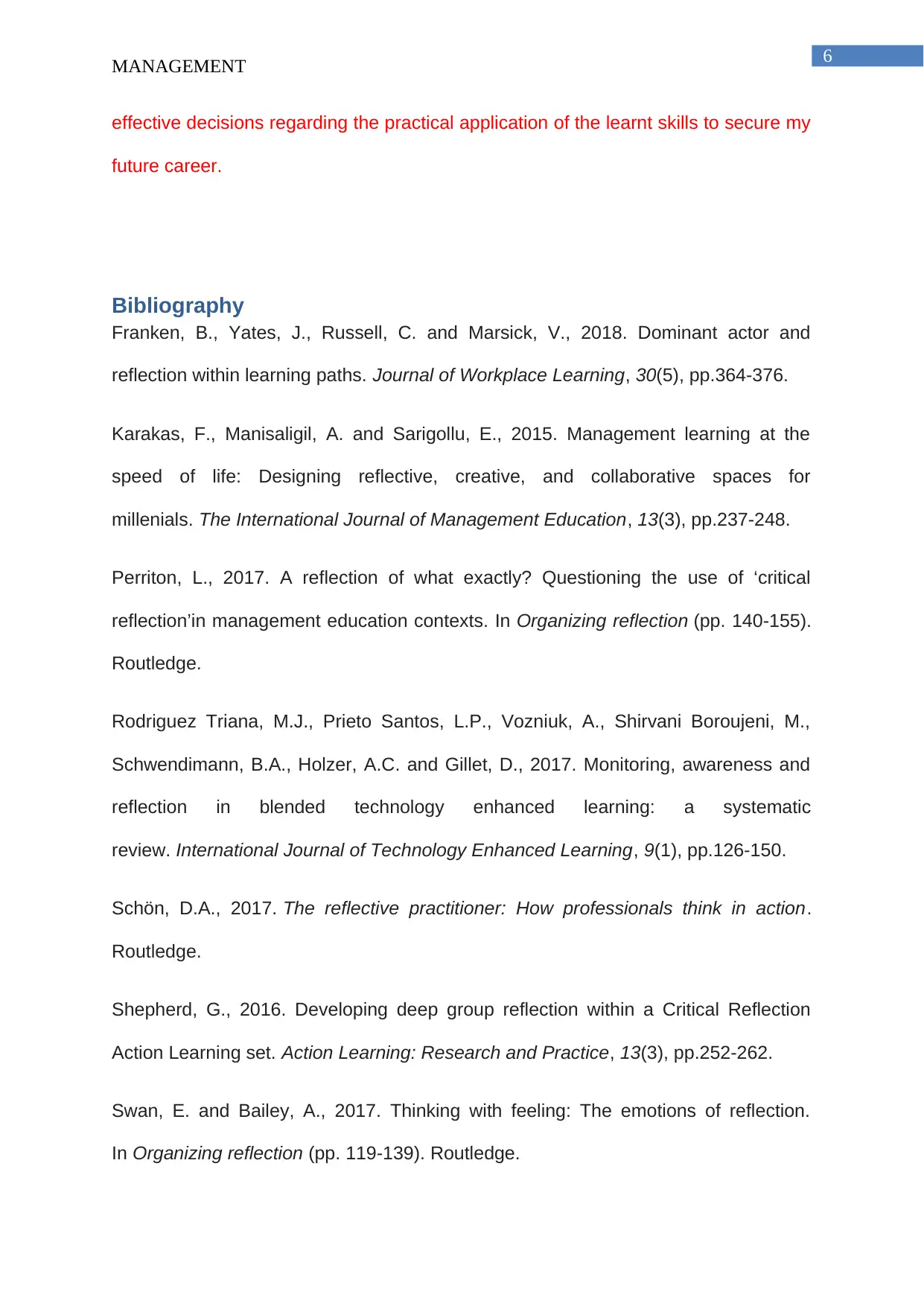
6
MANAGEMENT
effective decisions regarding the practical application of the learnt skills to secure my
future career.
Bibliography
Franken, B., Yates, J., Russell, C. and Marsick, V., 2018. Dominant actor and
reflection within learning paths. Journal of Workplace Learning, 30(5), pp.364-376.
Karakas, F., Manisaligil, A. and Sarigollu, E., 2015. Management learning at the
speed of life: Designing reflective, creative, and collaborative spaces for
millenials. The International Journal of Management Education, 13(3), pp.237-248.
Perriton, L., 2017. A reflection of what exactly? Questioning the use of ‘critical
reflection’in management education contexts. In Organizing reflection (pp. 140-155).
Routledge.
Rodriguez Triana, M.J., Prieto Santos, L.P., Vozniuk, A., Shirvani Boroujeni, M.,
Schwendimann, B.A., Holzer, A.C. and Gillet, D., 2017. Monitoring, awareness and
reflection in blended technology enhanced learning: a systematic
review. International Journal of Technology Enhanced Learning, 9(1), pp.126-150.
Schön, D.A., 2017. The reflective practitioner: How professionals think in action.
Routledge.
Shepherd, G., 2016. Developing deep group reflection within a Critical Reflection
Action Learning set. Action Learning: Research and Practice, 13(3), pp.252-262.
Swan, E. and Bailey, A., 2017. Thinking with feeling: The emotions of reflection.
In Organizing reflection (pp. 119-139). Routledge.
MANAGEMENT
effective decisions regarding the practical application of the learnt skills to secure my
future career.
Bibliography
Franken, B., Yates, J., Russell, C. and Marsick, V., 2018. Dominant actor and
reflection within learning paths. Journal of Workplace Learning, 30(5), pp.364-376.
Karakas, F., Manisaligil, A. and Sarigollu, E., 2015. Management learning at the
speed of life: Designing reflective, creative, and collaborative spaces for
millenials. The International Journal of Management Education, 13(3), pp.237-248.
Perriton, L., 2017. A reflection of what exactly? Questioning the use of ‘critical
reflection’in management education contexts. In Organizing reflection (pp. 140-155).
Routledge.
Rodriguez Triana, M.J., Prieto Santos, L.P., Vozniuk, A., Shirvani Boroujeni, M.,
Schwendimann, B.A., Holzer, A.C. and Gillet, D., 2017. Monitoring, awareness and
reflection in blended technology enhanced learning: a systematic
review. International Journal of Technology Enhanced Learning, 9(1), pp.126-150.
Schön, D.A., 2017. The reflective practitioner: How professionals think in action.
Routledge.
Shepherd, G., 2016. Developing deep group reflection within a Critical Reflection
Action Learning set. Action Learning: Research and Practice, 13(3), pp.252-262.
Swan, E. and Bailey, A., 2017. Thinking with feeling: The emotions of reflection.
In Organizing reflection (pp. 119-139). Routledge.
Paraphrase This Document
Need a fresh take? Get an instant paraphrase of this document with our AI Paraphraser
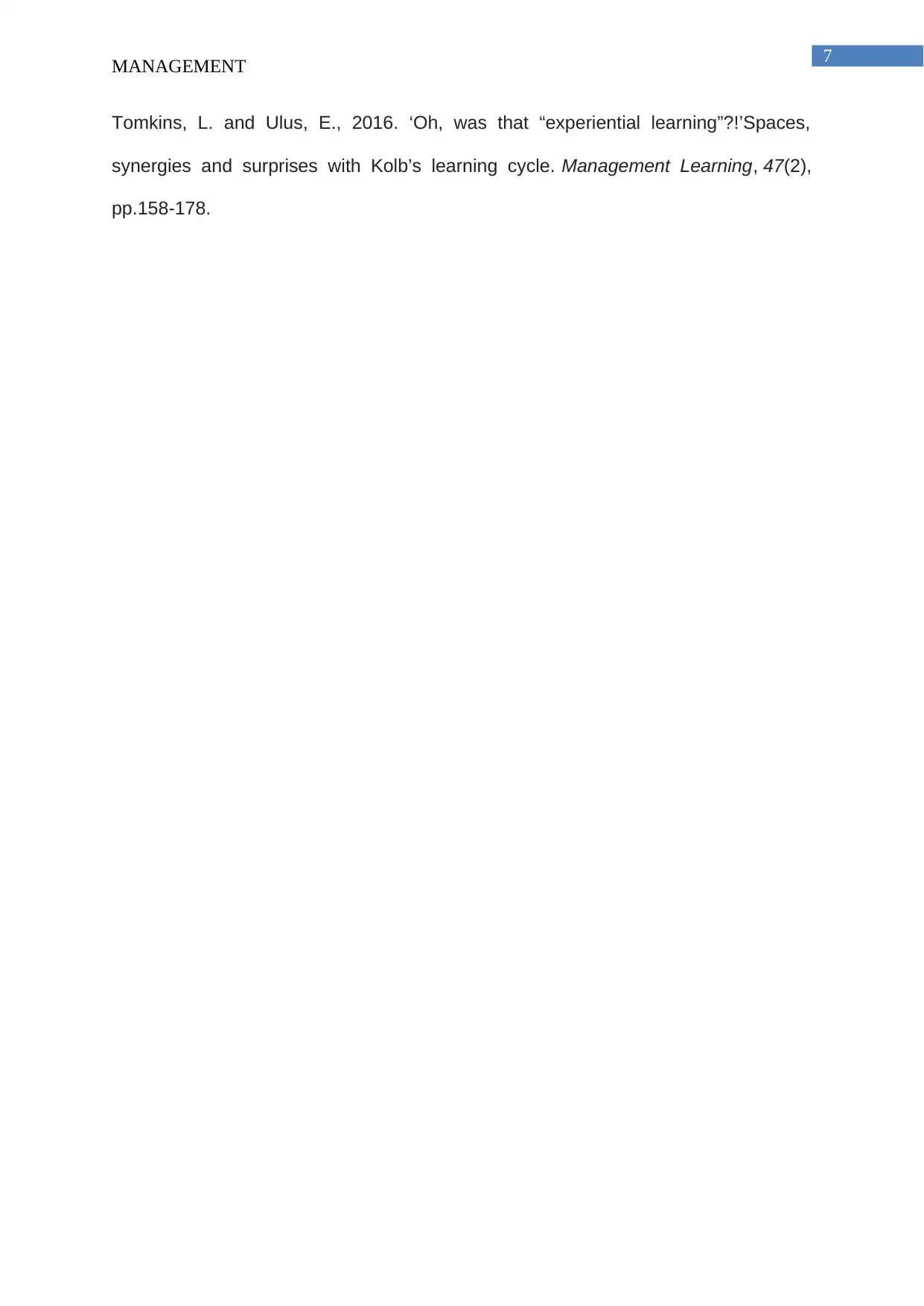
7
MANAGEMENT
Tomkins, L. and Ulus, E., 2016. ‘Oh, was that “experiential learning”?!’Spaces,
synergies and surprises with Kolb’s learning cycle. Management Learning, 47(2),
pp.158-178.
MANAGEMENT
Tomkins, L. and Ulus, E., 2016. ‘Oh, was that “experiential learning”?!’Spaces,
synergies and surprises with Kolb’s learning cycle. Management Learning, 47(2),
pp.158-178.
1 out of 8
Related Documents
Your All-in-One AI-Powered Toolkit for Academic Success.
+13062052269
info@desklib.com
Available 24*7 on WhatsApp / Email
![[object Object]](/_next/static/media/star-bottom.7253800d.svg)
Unlock your academic potential
Copyright © 2020–2026 A2Z Services. All Rights Reserved. Developed and managed by ZUCOL.





